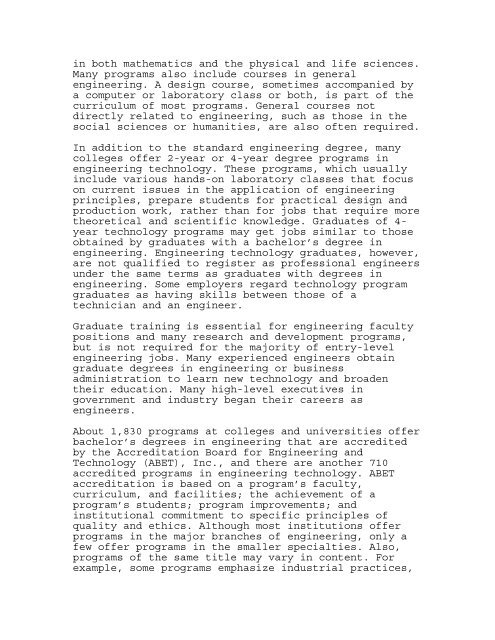http://www.bls.gov/oco/ocos027.htm Engineers ... - Aish Tamid
http://www.bls.gov/oco/ocos027.htm Engineers ... - Aish Tamid
http://www.bls.gov/oco/ocos027.htm Engineers ... - Aish Tamid
You also want an ePaper? Increase the reach of your titles
YUMPU automatically turns print PDFs into web optimized ePapers that Google loves.
in both mathematics and the physical and life sciences.<br />
Many programs also include courses in general<br />
engineering. A design course, sometimes accompanied by<br />
a computer or laboratory class or both, is part of the<br />
curriculum of most programs. General courses not<br />
directly related to engineering, such as those in the<br />
social sciences or humanities, are also often required.<br />
In addition to the standard engineering degree, many<br />
colleges offer 2-year or 4-year degree programs in<br />
engineering technology. These programs, which usually<br />
include various hands-on laboratory classes that focus<br />
on current issues in the application of engineering<br />
principles, prepare students for practical design and<br />
production work, rather than for jobs that require more<br />
theoretical and scientific knowledge. Graduates of 4year<br />
technology programs may get jobs similar to those<br />
obtained by graduates with a bachelor’s degree in<br />
engineering. Engineering technology graduates, however,<br />
are not qualified to register as professional engineers<br />
under the same terms as graduates with degrees in<br />
engineering. Some employers regard technology program<br />
graduates as having skills between those of a<br />
technician and an engineer.<br />
Graduate training is essential for engineering faculty<br />
positions and many research and development programs,<br />
but is not required for the majority of entry-level<br />
engineering jobs. Many experienced engineers obtain<br />
graduate degrees in engineering or business<br />
administration to learn new technology and broaden<br />
their education. Many high-level executives in<br />
<strong>gov</strong>ernment and industry began their careers as<br />
engineers.<br />
About 1,830 programs at colleges and universities offer<br />
bachelor’s degrees in engineering that are accredited<br />
by the Accreditation Board for Engineering and<br />
Technology (ABET), Inc., and there are another 710<br />
accredited programs in engineering technology. ABET<br />
accreditation is based on a program’s faculty,<br />
curriculum, and facilities; the achievement of a<br />
program’s students; program improvements; and<br />
institutional commitment to specific principles of<br />
quality and ethics. Although most institutions offer<br />
programs in the major branches of engineering, only a<br />
few offer programs in the smaller specialties. Also,<br />
programs of the same title may vary in content. For<br />
example, some programs emphasize industrial practices,





